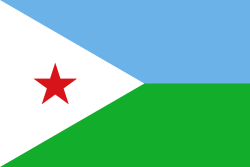 | |||
| Association | Djiboutian Football Federation | ||
|---|---|---|---|
| Confederation | CAF (Africa) | ||
| Sub-confederation | CECAFA (East Africa & Central Africa) | ||
| Head coach | | ||
| FIFA code | DJI | ||
| |||
| FIFA ranking | |||
| Current | 195 | ||
| Highest | 195 (March – June 2025) | ||
| Lowest | 195 (March – June 2025) | ||
| First international | |||
(Kenya; 26 March 2006) | |||
| Biggest win | |||
(Djibouti City, Djibouti; 24 October 2025) | |||
| Biggest defeat | |||
(17 November 2019) | |||
| World Cup | |||
| Appearances | 0 | ||
| Olympic Games | |||
| Appearances | 0 | ||
| African Women's Championship | |||
| Appearances | 0 | ||
The Djibouti women's national football team represents the country in international competitions. Football is organised by the Djiboutian Football Federation, with women's football formally organised in the country in 2002, and a national team was later created.
Contents
- History
- Background
- Performance
- Results and fixtures
- 2025
- Coaching staff
- Current coaching staff
- Manager history
- Players
- Current squad
- Recent call-ups
- Previous squads
- Records
- Most capped players
- Top goalscorers
- Competitive record
- FIFA Women's World Cup
- Olympic Games
- Africa Women Cup of Nations
- African Games
- CECAFA Women's Championship
- Honours
- All−time record against FIFA recognized nations
- Record per opponent
- See also
- References
- External links